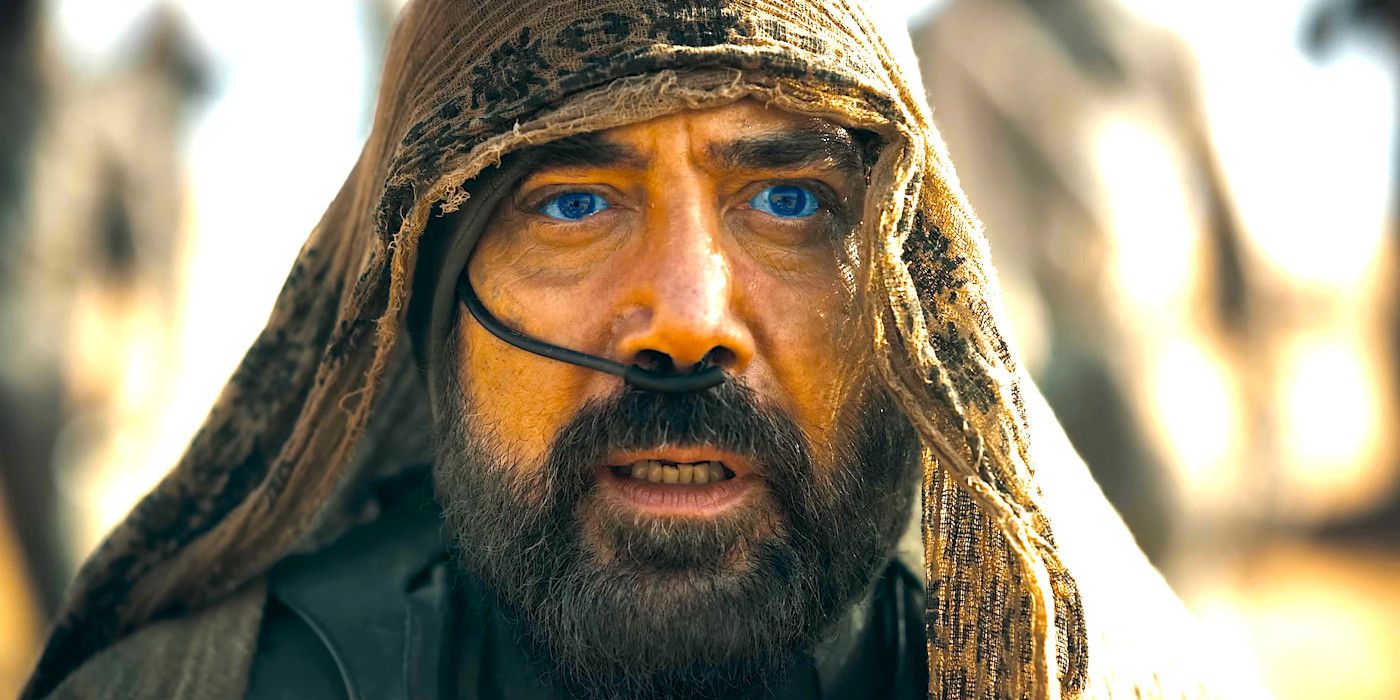
How The Book Made Dune 2’s Fremen Language Harder To Create
Summary
- The Fremen’s Chakobsa language in
Dune: Part Two
borrowed from real-world languages, complicating its recreation for the movies. - Linguistic experts developed a system to flesh out Chakobsa, building off what Frank Herbert originally featured in the books.
- Herbert’s ”
haphazard
” approach to languages may have contributed to author J. R. R. Tolkien’s criticism of the novel.
The linguists responsible for crafting Dune: Part Two’s Fremen language have explained the difficulties they faced in bringing it to life. Based on the classic 1965 sci-fi novel by Frank Herbert, Dune: Part Two features a much more in-depth exploration of the native people of Arrakis, among whom Timothée Chalamet’s Paul Atreides and Rebecca Ferguson’s Lady Jessica seek refuge following the events of Dune: Part One. Given the second movie’s greater focus on Fremen culture, many scenes feature dialogue spoken in the invented language known as Chakobsa.
Speaking with IndieWire, linguistic experts David and Jessie Peterson detailed the challenges they faced in bringing the Chakobsa scenes to life due to Herbert’s approach in the Dune book to creating the language. Rather than inventing most of the words in the Chakobsa language, the Petersons explained that Herbert borrowed “haphazardly” from other real-world languages and adapted their meanings. As such, the pair had to develop their own system to help flesh out the language featured in Herbert’s original books. Check out their comments below:
David Peterson:
[Frank Herbert] just changed the meaning and said that it had something to do with water. A lot of [Chakobsa] is just borrowed kind of haphazardly from different languages. We just had to come up with our own system and incorporate it as best we could.Basically, I started with the word for water, and then I grabbed other words that were from the books and had a very definite meaning. The word for sun, the word for heart. And then I created something so that we could get
shadout
to mean well-dipper somehow. The main [challenge] is how can we support the forms that exist? And the suggestion of grammar, if it’s there or if there isn’t any: What grammar can we create that isn’t contradicted by what’s already thereJessie Peterson:
There are projects where we’ve worked on where every single utterance is a command. And so really, as long as you know how to say, ‘run,’ ‘open the door,’ ‘stop,’ you just need a grammar in place to do these imperative forms. You may never get into things like modifiers and relative clauses and all these more intricate things that require more detail.
Dune’s Languages May Explain One Of Frank Herbert’s Most Famous Critics
When Herbert first published Dune in the mid 1960s, the book was far from the immediate bestseller that later audiences would have assumed it to be. Nonetheless, Herbert’s complex themes and intricate world building would prove popular with readers and critics alike, and it has regularly been credited with impacting the science fiction genre in the same way that J.R.R. Tolkien’s The Lord of the Rings influenced fantasy. With expansive scope and epic tales rooted in thousands of years of history, Dune and The Lord of the Rings share much in common.
However, shortly after Dune’s original release, Tolkien is famously known for suggesting that he “dislike[d] Dune with some intensity,” but refused to elaborate on his reasons out of respect for a fellow author. As a linguist responsible for crafting many of his own fictional languages, it is possible that Herbert’s more “haphazard” approach to crafting his own languages may have been the source of much consternation to the famous fantasy author. Moreover, as a keen student of many tongues, Tolkien would have been acutely aware of the many of the original meanings behind the words Herbert co-opted to craft Chakobsa.
|
Dune Word or Phrase |
Meaning |
Real World Origins |
|
Bene Gesserit |
Powerful matriarchal order with vast mental powers |
Based on the Christian Latin word Jesuit |
|
Chakobsa |
Language of the Fremen of Arrakis |
A real-world secret Caucasus language used by princes and nobles |
|
Lisan al Gaib |
The Voice from the Outer World |
Arabic – “The tongue of the unseen” |
|
Shai-Hulud |
The sandworms of Arrakis |
Arabic – “thing of eternity” |
|
Kanly |
Formal feud under the Great Convention |
Turkish – “blood feud” |
Nonetheless, Dune frequently ranks alongside The Lord of the Rings as one of the most important works of fiction of all time, and its own importance can not be understated. Moreover, with Denis Villeneuve’s Dune: Part Two currently capturing the attention of audiences worldwide, a whole new generation of readers will likely be turning their attention to the original book that inspired it.
Source: IndieWire

Dune: Part Two
Dune: Part Two is the sequel to Denis Villeneuve’s 2021 film that covers the novel’s events by Frank Herbert. The movie continues the quest of Paul Atreides on a journey of revenge against those who slew his family. With insight into the future, Atreides may be forced to choose between his one true love and the universe’s fate.
- Release Date
- March 1, 2024
- Studio(s)
- Legendary Pictures
- Distributor(s)
- Warner Bros. Pictures
- Budget
- $122 Million





